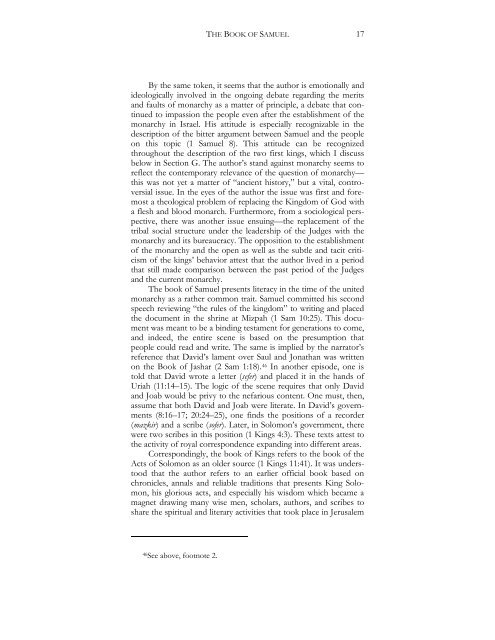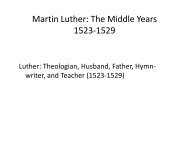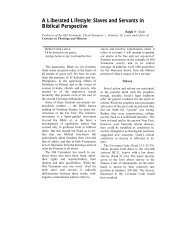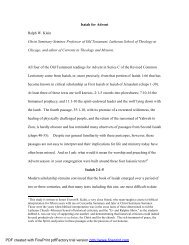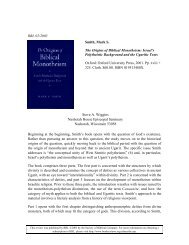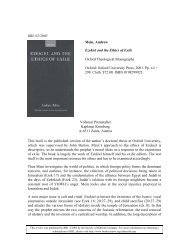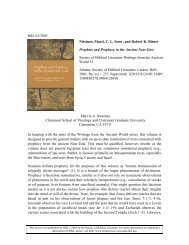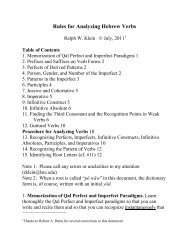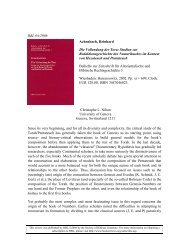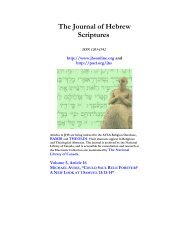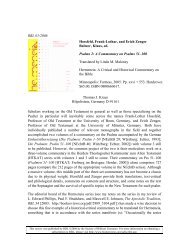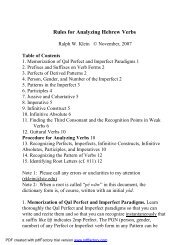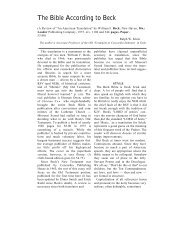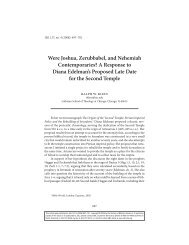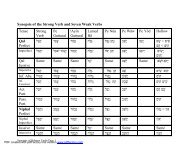The Book of Samuel: Its Composition, Structure and Significance as ...
The Book of Samuel: Its Composition, Structure and Significance as ...
The Book of Samuel: Its Composition, Structure and Significance as ...
You also want an ePaper? Increase the reach of your titles
YUMPU automatically turns print PDFs into web optimized ePapers that Google loves.
THE BOOK OF SAMUEL<br />
By the same token, it seems that the author is emotionally <strong>and</strong><br />
ideologically involved in the ongoing debate regarding the merits<br />
<strong>and</strong> faults <strong>of</strong> monarchy <strong>as</strong> a matter <strong>of</strong> principle, a debate that continued<br />
to imp<strong>as</strong>sion the people even after the establishment <strong>of</strong> the<br />
monarchy in Israel. His attitude is especially recognizable in the<br />
description <strong>of</strong> the bitter argument between <strong>Samuel</strong> <strong>and</strong> the people<br />
on this topic (1 <strong>Samuel</strong> 8). This attitude can be recognized<br />
throughout the description <strong>of</strong> the two first kings, which I discuss<br />
below in Section G. <strong>The</strong> author’s st<strong>and</strong> against monarchy seems to<br />
reflect the contemporary relevance <strong>of</strong> the question <strong>of</strong> monarchy—<br />
this w<strong>as</strong> not yet a matter <strong>of</strong> “ancient history,” but a vital, controversial<br />
issue. In the eyes <strong>of</strong> the author the issue w<strong>as</strong> first <strong>and</strong> foremost<br />
a theological problem <strong>of</strong> replacing the Kingdom <strong>of</strong> God with<br />
a flesh <strong>and</strong> blood monarch. Furthermore, from a sociological perspective,<br />
there w<strong>as</strong> another issue ensuing—the replacement <strong>of</strong> the<br />
tribal social structure under the leadership <strong>of</strong> the Judges with the<br />
monarchy <strong>and</strong> its bureaucracy. <strong>The</strong> opposition to the establishment<br />
<strong>of</strong> the monarchy <strong>and</strong> the open <strong>as</strong> well <strong>as</strong> the subtle <strong>and</strong> tacit criticism<br />
<strong>of</strong> the kings’ behavior attest that the author lived in a period<br />
that still made comparison between the p<strong>as</strong>t period <strong>of</strong> the Judges<br />
<strong>and</strong> the current monarchy.<br />
<strong>The</strong> book <strong>of</strong> <strong>Samuel</strong> presents literacy in the time <strong>of</strong> the united<br />
monarchy <strong>as</strong> a rather common trait. <strong>Samuel</strong> committed his second<br />
speech reviewing “the rules <strong>of</strong> the kingdom” to writing <strong>and</strong> placed<br />
the document in the shrine at Mizpah (1 Sam 10:25). This document<br />
w<strong>as</strong> meant to be a binding testament for generations to come,<br />
<strong>and</strong> indeed, the entire scene is b<strong>as</strong>ed on the presumption that<br />
people could read <strong>and</strong> write. <strong>The</strong> same is implied by the narrator’s<br />
reference that David’s lament over Saul <strong>and</strong> Jonathan w<strong>as</strong> written<br />
on the <strong>Book</strong> <strong>of</strong> J<strong>as</strong>har (2 Sam 1:18). 46 In another episode, one is<br />
told that David wrote a letter (sefer) <strong>and</strong> placed it in the h<strong>and</strong>s <strong>of</strong><br />
Uriah (11:14–15). <strong>The</strong> logic <strong>of</strong> the scene requires that only David<br />
<strong>and</strong> Joab would be privy to the nefarious content. One must, then,<br />
<strong>as</strong>sume that both David <strong>and</strong> Joab were literate. In David’s governments<br />
(8:16–17; 20:24–25), one finds the positions <strong>of</strong> a recorder<br />
(mazkir) <strong>and</strong> a scribe (s<strong>of</strong>er). Later, in Solomon’s government, there<br />
were two scribes in this position (1 Kings 4:3). <strong>The</strong>se texts attest to<br />
the activity <strong>of</strong> royal correspondence exp<strong>and</strong>ing into different are<strong>as</strong>.<br />
Correspondingly, the book <strong>of</strong> Kings refers to the book <strong>of</strong> the<br />
Acts <strong>of</strong> Solomon <strong>as</strong> an older source (1 Kings 11:41). It w<strong>as</strong> understood<br />
that the author refers to an earlier <strong>of</strong>ficial book b<strong>as</strong>ed on<br />
chronicles, annals <strong>and</strong> reliable traditions that presents King Solomon,<br />
his glorious acts, <strong>and</strong> especially his wisdom which became a<br />
magnet drawing many wise men, scholars, authors, <strong>and</strong> scribes to<br />
share the spiritual <strong>and</strong> literary activities that took place in Jerusalem<br />
46 See above, footnote 2.<br />
17


